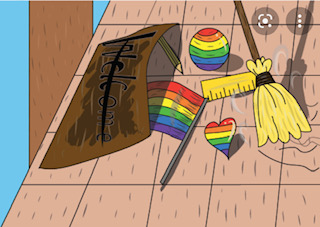“Don’t Say Gay Bill”

Source: https://dailyegyptian.com/wp-content/uploads/2022/03/Untitled-7-cmyk-01.png
May 10, 2022
The Parental Right in Education act, known as the Don’t Say Gay bill, as its opponents call it, became law in Florida on March 31st, 2022. The law limits discussion of sexual orientation and gender identity in classrooms in Florida. The article titled “Florida’s controversial Don’t Say Gay Bill: What’s inside the proposed law”, posted on NBC News, states that it “may not occur in kindergarten through grade 3 or in a manner that is not age-appropriate or developmentally appropriate for students in accordance with state standards.”
This law allows parents to sue a school district, at the school district’s expense, if they believe the measure is not being enforced. The bill also prohibits school support service personnel from withholding information regarding a student’s “mental, emotional, or physical health or well-being”. That means school counsellors would have to inform parents if a student told them they were gay or trans, even if such disclosure could be harmful to the student.
According to the article “Do not Say Gay bill sponsor is baffled by LGBTQ trend” posted on the website for the Day Newspaper, Republican Senator Dennis Baxley, the bill sponsor, framed the legislation as reinforcing parents to control the upbringing of their children. He’s rejected the “Don’t say gay bill” nickname because the legislation does not actually use the word gay. The opponents, however, have said that beyond creating a “dangerous environment,” the law makes discussion of sexual orientation overly “vague.”
LGBT reports high rates of seriously considering suicide
Suicide is the second leading cause of death for American adolescents, especially in the LGBTQ community. According to the YouTube video, “Pride: Are LGBT politicians cracking the glass ceiling” <https://qz.com/1268388/has-the-lgbt-political-glass-ceiling-cracked-yet/,> Bismi Alimi, an executive director, and Leslie Herod, Colorado state representative, agree that at least part of the reason for the elevated rates of suicidal thoughts, plans, and attempts, and poor mental health outcomes found among LGBTQ people is the social stigma, prejudice, and discrimination that contribute to the minority stress of being LGBTQ. The escalation of state policies that are harmful to LGBTQ people will only heighten and intensify experiences of rejection and discrimination and could lead to an increase in suicidal ideation.
The bill also prompted a response from the White House with US President Joe Biden calling it “hateful legislation” in a tweet, promising his administration would “continue to fight for the protections and safety” the LBGTQ+ community deserves.
Teachers are trying to understand the law
Many teachers are unclear about how the law will affect them, Ms. Clark, 9th and 10th grade English teacher, thinks that the bill states that teachers in the state of Florida are not allowed to educate students about gender identity or sexuality, specifically for children in grades K-8. She personally does not agree with the implications of this bill as they would make LGBT children/teens feel uncomfortable. She thinks “it would also make LGBT teachers uncomfortable as well as students with gay parents.
“It sets a dangerous precedent,” she said.” She believes that education should be protected and teachers above all should be protected in addition to students. “It is our responsibility to ensure that our students feel safe in our class and saying that their identity does not matter or is unspeakable ensures that students feel unsafe within our walls. “Too much interference from the government can be negative and suffocating.” She disagrees with the implication that teachers should “out” or expose a student’s sexuality to their parents.
Dr. Yoham, biology teacher, thinks any kind of discrimination should not be tolerated. He thinks that the law says that educators cannot bring the discussion of gender to grades K-3 or any other time that is not age appropriate. “I feel how the law empowers parents to sue the school district can make students feel isolated,” said Dr. Yoham. If one of his students were part of the LGBT, he would not expose them to their parents. “I do not feel like it is my place to discuss personal things that do not affect the education of a student,” he said.
Students do understand the law
The law is effectively a statement that classroom education about sexual orientation and gender shouldn’t start at an early age, and that parents should have final say about what their children learn and when. It aims to “reinforce the fundamental right of parents to make decisions regarding the upbringing and control of their children,” according to the text of the legislation.
Junior Amy Gonzalez thinks that the gay bill says that schools may not be able to instruct about gender expression or sexual orientation from kindergarten until 3rd grade. After 3rd grade, it must be “age appropriate”. She says that sex education is already banned until 5th grade and even if gender expression and sexual orientation are not able to be discussed in school, children might see these things while in their communities.
Providing a Safe Space For LGBT
According to the article “What Florida’s ‘Don’t Say Gay’ Bill Could Mean for LGBTQ Kids”, posted on the website for TIME magazine, “It’s meant to stigmatize LGBTQ youth and family members, and to make teachers fearful of providing a welcoming and inclusive classroom.”
Many students are against what this bill stands for. Freshman Chloe Lopez believes the bill says that teachers cannot teach about things that are LGBT. She feels it’s disrespectful because the LGBT people have worked so hard to have the rights that they have and to be accepted by most. “I feel horrible for people who are confused with their sexuality and will not be able to learn about LGBT history,” said Chloe. She thinks that people do not know the struggles that people in the LGBT community have gone through to have the rights they have so far.
Sophomore Robert Loras says, “It is important for the LGBT to have a normality to be who they are.” He thinks this bill causes a lot of unnecessary problems.
Freshman Miguelangel Hernadez thinks that “empowering” the parents to sue could be extremely dangerous for the school systems.
Similarly, Courtney English, who works with LGBT people as a travel agent, disagrees with this bill because she thinks it is very vague and opens school systems for legal battles that they do not always have the resources to support. Additionally, she feels like children should be supported no matter if their personal expression is a secret and not accepted. She does not understand the benefits of this bill. She thinks to move forward as a more accepting and loving society, we should embrace people as they are and not hide them.
Key passages in the bill
-
Instruction on gender and sexuality would be constrained in all grades.
-
Schools would be required to notify parents when children receive mental, emotional or physical health services, unless educators believe there is a risk of “abuse, abandonment, or neglect.”
-
Parents would have the right to opt their children out of counseling and health services.
-
Parents could sue schools for violating the vaguely written bill, and districts would have to cover the costs.
-
Florida would rewrite school counseling standards.





Elizabeth Perry • May 12, 2022 at 11:41 am
A very interesting article well presented;. Thank you for the accuracy of research and for the comments from students and teachers. I appreciate views on any subject that concerns society and the well being of its citizens. Thank you.
Maria Soberon • May 12, 2022 at 7:26 am
Children should feel comfortable and confident with who they are and it would happen naturally, we as parents need to show support and understanding, the equivalent of love. “Whisper Words of Wisdom Let it Be”